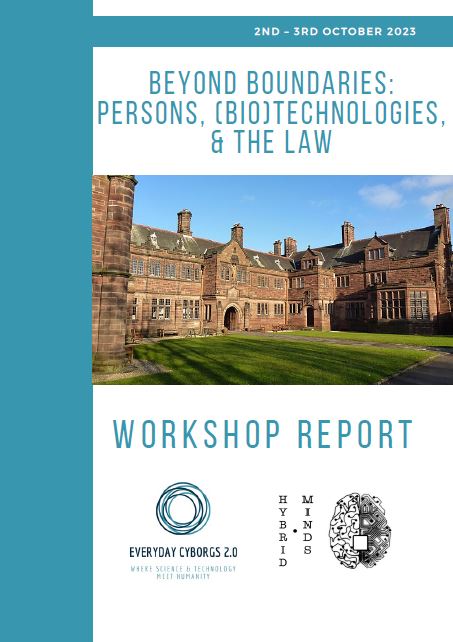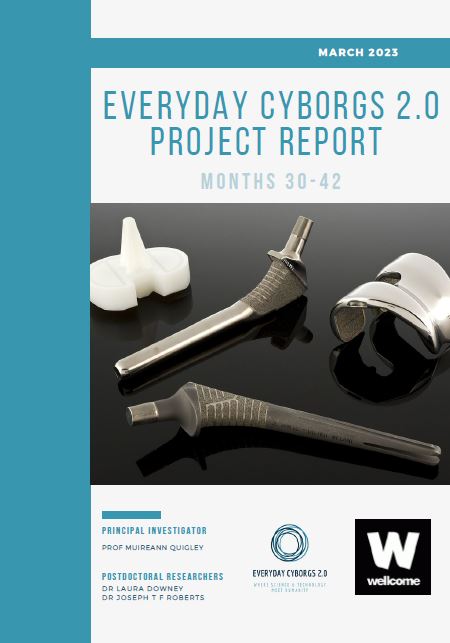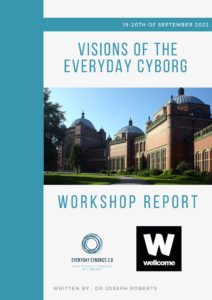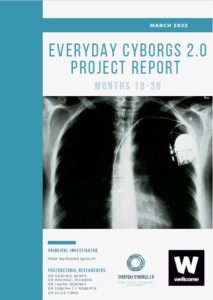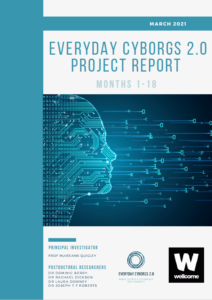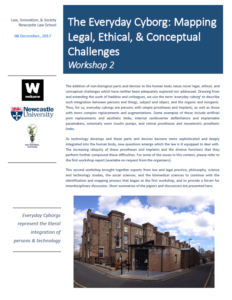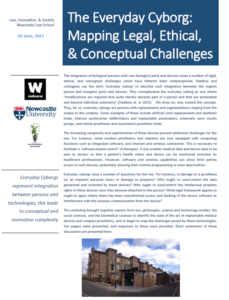2023
Beyond Boundaries: Persons, (Bio)Technologies,& the Law
Workshop held at Gladstone’s Library, Hawarden on the 2nd – 3rd of October 2023
Read the full report here or by clicking on the image (right)
Earlier in October, the Everyday Cyborgs 2.0 and Hybrid minds project hosted a two-day workshop at the Gladstone Library, Hawarden. The workshop brought together an interdisciplinary group of scholars including lawyers, clinicians, sociologists and philosophers to discuss the challenges the integration of medical devices with the human body pose to the boundary between people and things.
Short summaries of the papers can be found in the workshop report which can be downloaded here, or by clicking on the icon.
Funding: This workshop was supported by a Wellcome Trust Investigator Award in Humanities and Social Sciences 2019-2024 (Grant No: 212507/Z/18/Z).
Everyday Cyborgs 2.0 Progress Report: Months 30-42
Report Published March 2023
Read the full report here or by clicking on the image (right)
In this report we set out what we have achieved in months 30-42 of the Everyday Cyborg research project, as well as outlining the research and other activities we intend to pursue over the coming year.
In particular, in this report you will find updates on: the team’s empirical work, our research on the notion of embodiment, and our research into medical device regulation. The report also contains an overview of events we have held, our dissemination and engagement activities, a list of publications and outputs, and an outline of future activities.
2022
Visions of the Everyday Cyborg Workshop
Workshop held at the University of Birmingham on the 19th– 20th of September 2022
Read the full workshop report here or by clicking on the image (right)
Earlier in September, the Everyday Cyborgs 2.0 project hosted a two-day workshop at the University of Birmingham’s Edgbaston Park Hotel. The workshop brought together an interdisciplinary group of scholars including lawyers, clinicians, sociologists, cybersecurity researchers, and regulatory experts to discuss the regulation of medical devices.
Short summaries of the papers are presented in the workshop report which can be downloaded here, or by clicking on the icon.
Funding: This workshop was supported by a Wellcome Trust Investigator Award in Humanities and Social Sciences 2019-2024 (Grant No: 212507/Z/18/Z).
Manchester Centre for Political Theory Workshop: Embodiment in Ethics, Political Philosophy, and Law
Workshop held on the 6th– 9th of September 2022
Organiser: Joseph T F Roberts
Read the full workshop report here or by clicking on the image (right)
Earlier in September, the Everyday Cyborgs 2.0 project hosted a panel as part of the Mancept Workshops at the University of Manchester. The panel, organised by project researcher Joseph Roberts, brought together philosophers and bioethicists to discuss how we might take better account of embodiment in ethical theorising, political philosophy, public policy, and law.
The rationale for the panel centred on the fact that everyone has a body, and what our bodies are like can have deep and pervasive effects on how we live our lives. How we perceive the world, how we act in it, what we are vulnerable to, and how others perceive and interact with us are all affected by how we are embodied. As such, given the extensive influence our embodiment has on our lives, one might expect questions about our embodiment to feature prominently in ethical theory and political philosophy. This, however, has not been the case. Critics of dominant approaches to ethical theory and political philosophy argue that they pay insufficient attention to the deep and ubiquitous effects embodiment has on our lives.
Short summaries of the papers are presented in the panel report which can be downloaded here or by clicking on the icon.
Funding: This workshop was supported by a Wellcome Trust Investigator Award in Humanities and Social Sciences 2019-2024 (Grant No: 212507/Z/18/Z)
Everyday Cyborgs 2.0 Progress Report: Months 18-30
Report published March 2022
Read the full report here or by clicking on the image (right)
In this report we set out what we have achieved in months 18-30 of the Everyday Cyborg research project, as well as outlining the research and other activities we intend to pursue over the coming year.
In particular, in this report you will find updates on: the team’s empirical work, our research into software as a medical device, our research into historicising the Everyday Cyborg, and our research on embodiment and medical devices. There is also an overview of our dissemination and engagement activities, a list of publications and outputs, an outline of future activities, and an introduction to the new members of the team.
2021
Everyday Cyborgs 2.0 Progress Report: Months 1-18
Report published March 2021
Read the full report here or by clicking on the image (right)
In this report we set out what we have achieved during the first year and a half of our project, as well as outlining the research avenues and activities we are planning over the coming year.
In particular in this report you will find an update on the team’s research into Everyday Cyborgs and the Law, the Medicines and Medical Devices Act 2021, and Do-it-Yourself Artificial Pancreas Systems (DIY APS). The report also contains an overview of our dissemination and engagement activities, a list of publications and outputs, an outline for future activities and an introduction to the members of the team.
2017
Workshop 2: The Everyday Cyborg: Mapping Legal, Ethical, & Conceptual Challenges
Workshop held on the 8th of December 2017
Organisers: Muireann Quigley and Semande Ayihongbe
Read the full workshop report here or by clicking on the image (right)
The addition of non-biological parts and devices to the human body raises novel legal, ethical, and conceptual challenges which have neither been adequately explored nor addressed. Drawing from and extending the work of Haddow and colleagues, we use the term ‘everyday cyborg’ to describe such integration between persons and things, subject and object, and the organic and inorganic. Thus, for us, everyday cyborgs are persons with simple prostheses and implants, as well as those with more complex replacements and augmentations. Some examples of these include artificial joint replacements and aesthetic limbs, internal cardioverter defibrillators and implantable pacemakers, externally worn insulin pumps, and retinal prostheses and myoelectric prosthetic limbs.
As technology develops and these parts and devices become more sophisticated and deeply integrated into the human body, new questions emerge which the law is ill equipped to deal with. The increasing ubiquity of these prostheses and implants and the diverse functions that they perform further compound these difficulties. For some of the issues in this context, please refer to the first workshop report (available here).
This second workshop brought together experts from law and legal practice, philosophy, science and technology studies, the social sciences, and the biomedical sciences to continue with the identification and mapping process that began at the first workshop, and to provide a forum for interdisciplinary discussion. Short summaries of the papers and discussions are presented in the report.
Funding: This workshop was supported by a Wellcome Trust Seed Award in Humanities and Social Science 2016 (Grant No: 201675/Z/16/Z).
Workshop 1: The Everyday Cyborg: Mapping Legal, Ethical, & Conceptual Challenges
Workshop held on the 2nd of June 2017.
Organisers: Muireann Quigley and Semande Ayihongbe
Read the full workshop report here or by clicking on the image (right)
The integration of biological persons with non-biological parts and devices raises a number of legal, ethical, and conceptual challenges which have hitherto been underexplored. Haddow and colleagues use the term ‘everyday cyborg’ to describe such integration between the organic person and inorganic parts and devices. They conceptualise the everyday cyborg as one where “modifications are required that quite literally become part of a person and that are automated and beyond individual autonomy” (Haddow et. al 2015). We draw on, and, extend this concept.
Thus, for us, everyday cyborgs are persons with replacements and augmentations ranging from the simple to the complex. Some examples of these include artificial joint replacements and aesthetic limbs, internal cardioverter defibrillators and implantable pacemakers, externally worn insulin pumps, and retinal prostheses and myoelectric prosthetic limbs.
Everyday cyborgs raise a number of questions for the law. For instance, is damage to a prosthesis (or an implant) personal injury or damage to property? Who ought to own/control the data generated and collected by these devices? Who ought to own/control the intellectual property rights in these devices once they become attached to the person? What legal framework applies or ought to apply where there has been unauthorised access and hacking of the device software or interference with the wireless communication from the device?
This workshop brought together experts from law, philosophy, science and technology studies, the social sciences, and the biomedical sciences to identify the state of the art of implantable medical devices and complex prosthetics, and to begin to map the challenges posed by these technologies. Ten papers were presented, and responses to these were provided. Short summaries of these discussions are presented in the report.
Funding: This workshop was supported by a Wellcome Trust Seed Award in Humanities and Social Science 2016 (Grant No: 201675/Z/16/Z).

